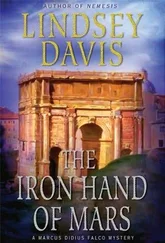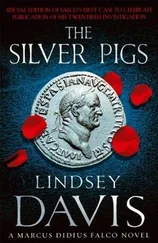Lindsey Davis - The Ides of April
Здесь есть возможность читать онлайн «Lindsey Davis - The Ides of April» весь текст электронной книги совершенно бесплатно (целиком полную версию без сокращений). В некоторых случаях можно слушать аудио, скачать через торрент в формате fb2 и присутствует краткое содержание. Год выпуска: 2013, ISBN: 2013, Издательство: Minotaur Books, Жанр: Исторический детектив, на английском языке. Описание произведения, (предисловие) а так же отзывы посетителей доступны на портале библиотеки ЛибКат.
- Название:The Ides of April
- Автор:
- Издательство:Minotaur Books
- Жанр:
- Год:2013
- ISBN:9781250023698
- Рейтинг книги:3 / 5. Голосов: 1
-
Избранное:Добавить в избранное
- Отзывы:
-
Ваша оценка:
- 60
- 1
- 2
- 3
- 4
- 5
The Ides of April: краткое содержание, описание и аннотация
Предлагаем к чтению аннотацию, описание, краткое содержание или предисловие (зависит от того, что написал сам автор книги «The Ides of April»). Если вы не нашли необходимую информацию о книге — напишите в комментариях, мы постараемся отыскать её.
The Ides of April — читать онлайн бесплатно полную книгу (весь текст) целиком
Ниже представлен текст книги, разбитый по страницам. Система сохранения места последней прочитанной страницы, позволяет с удобством читать онлайн бесплатно книгу «The Ides of April», без необходимости каждый раз заново искать на чём Вы остановились. Поставьте закладку, и сможете в любой момент перейти на страницу, на которой закончили чтение.
Интервал:
Закладка:
"Who are the two toughs in the garden?"
"Zoe and Chloe. They're harmless-even though they think they terrify everyone. What you working on? Anything interesting?" Prisca knew what I did. Sometimes she shuffled clients my way.
"Nothing special." I was always discreet. "My last employer just died on me."
She laughed. "You do know how to pick em!"
"Apparently people are dropping dead before their time, for no reason."
"Is that so?" Prisca showed no interest. If there was a crisis, clearly news had not reached the bathhouse circuit. I was interested, because baths are where most rumours first pop into life.
I finished my routine and Prisca left me to it. I dried off, put on one of the clean tunics I had fetched from the laundry, then sat by myself in the colonnade. The show-offs with swords and shields had gone, so I was alone. That suited me. I liked certain people, but otherwise was naturally reclusive. I could hear Prisca and her various slaves moving about and occasionally speaking to each other, but no one bothered me. I did not think about my work, I just restored my spirits peacefully.
If I had come later, I would have had a session with Serena, the best physical manipulator on the Aventine, but she tended to work in the evening when the baths were officially open. Combing my hair dry in a patch of sunshine served to calm me almost as much as a massage. The long slow strokes always reminded me of those first months after I was brought to Rome. I very quickly got to know all of my new female relatives; they were numerous, and I learned to dread the heavy-handed ones. Every time any of them visited our house, I would be passed across to be worked on. Most women in Rome own a nit-comb and are adept at using it.
I have dark hair which, unfortunately, gives no clue to my original nationality. I will always remember the first time Helena washed it for me: her firm but kindly touch as she made me endure the warm water on my tender scalp, while I whimpered and wriggled, then the wonderful clean scent of rosemary as she rinsed and untangled everything. She could have had a slave look after me, but she had chosen to foster me, so she herself carried out all the unpleasant tasks of cleaning me up and taming my wild habits. I wanted so desperately to be mothered, at first I could hardly bear to trust her in case our new relationship abruptly ended. It took me years to realise that motherhood did not come to her naturally; she saw it as a duty and would much rather have been reading, or spending time with her husband.
She loved us now. No, that sounds wrong; she had always given us love, willingly and amply, but she enjoyed us more, now we were older and she could talk to us as equals.
She had hated it when I left home to make my own life as an informer, seeing my exit as her own failure. But she too was a dogged, independent spirit; I had learned that from her. Undoubtedly, she was proud of me now. I often went home and consulted her about my work.
Thinking about her, I decided to have lunch with Mother today.
The girls were out, visiting friends, and our brother was having lessons, so I stayed for hours, talking and not talking, just spending time together. Just when I was thinking I should leave, the girls reappeared, full of excitement; then Father came home from the auction house, so we all adjourned to the roof terrace for the ceremony of hearing about his day. Many bowls of olives later, I declined the offer of dinner, and made my way back up the Hill to Fountain Court.
I was in a good mood. Most of the day had gone by, but who cared? That is the bonus of being freelance. You can make your own hours-always an excuse for working no hours at all.
My mood improved even more when Rodan emerged to tell me that Metellus Nepos had called while I was away, and had left something for me. He had brought my payment for the work I did for Salvidia, plus extra for when he hired me himself. He had even presented me with a sample of his cheese too. Such a civilised man. Immediately my benign feelings towards him reasserted themselves.
It was too late to apply myself to work, and since I didn't know how long Nepos would remain in Rome now the funeral was over, I decided to trip around to Lesser Laurel Street, tell him his offerings had been safely received and say thank you.
That was when I found him in a terrible tizzy. He was about to visit the house of a neighbour who had died, just after she attended his stepmother's funeral. Celendina was her name. I had not known that previously, but I gathered she was the old woman I had talked to at the necropolis. That alone gave me a reason to accompany Nepos and pay my own respects-even though he and I both knew I was going along out of professional curiosity. Celendina had been perfectly well yesterday, a self-sufficient body who had stood at the side of the pyre without complaint until she had to leave. I could still see her in my mind's eye, as she toddled off home at a good pace. Although she was elderly, Nepos and I were both amazed to learn she had died barely hours afterwards.
Nepos was very upset. I could not blame him. There seemed a striking similarity to what happened with his stepmother. Neither of us thought it was a coincidence.
Celendina had lived just around the corner. As I walked there with Metellus Nepos, I tried calming him, to little avail.
Some well-disposed neighbour had supplied a couple of small cypress trees to stand either side of the doorway. People who lived locally were keeping a sharp eye out for visitors, as they do when something odd has happened and they don't want to miss what follows. We soon had several helpful persons presenting us with information.
It was a night and a day since the old woman had been found dead. Her body was no longer at the house but had been taken away by the undertaker-an officially supplied one. Somehow the vigiles had become involved at the scene. From what we heard, I realised their removing the body was for a corpse-inspection, in a case of presumed foul play. But this sounded different to what occurred before with Salvidia, at least in the neighbours' version-a sorry tale that only emerged slowly as people started to feel uncomfortable about it.
It was her son Celendina had lived with and vigiles' suspicions centred on him. As I had deduced, he had been not right from birth; we were told that only people who knew him very well could communicate with him. He was never able to go out, and had grown into a strange, heavy lump who became upset if he was alone for too long, so that was why his mother left the funeral early. Sometimes in the past a neighbour had minded him for Celendina, but I could tell they had never liked doing it. No one wanted to take over full-time care of him now. Motherless, his future was uncertain.
The son, Kylo, was no longer at the house. The neighbours said people had been drawn there last night by him screaming and shouting. They broke in and found him with his mother's lifeless body, violently shaking her. Everyone at once assumed something had gone wrong between them and he must have killed her. In such circumstances, people easily turn against a man with mental difficulties. Uproar ensued. The vigiles arrived. Now Kylo was in custody, accused of his mother's murder.
One peculiarity of the events was that, although no one could make sense of most things Kylo said, when they found him he distinctly said several times: "Flavia Albia." My name.
XII
I made sure I got to the vigiles before they came looking for me.
Our local cohort was the Fourth. Their headquarters was in the Twelfth District, over in the Piscina Publica, by the Aqua Marcia. They had sub-barracks too, one of which covered the Thirteenth, here on the Aventine. I knew it well. I had been coming here as long as I had lived in Rome, so it held no terrors for me.
Читать дальшеИнтервал:
Закладка:
Похожие книги на «The Ides of April»
Представляем Вашему вниманию похожие книги на «The Ides of April» списком для выбора. Мы отобрали схожую по названию и смыслу литературу в надежде предоставить читателям больше вариантов отыскать новые, интересные, ещё непрочитанные произведения.
Обсуждение, отзывы о книге «The Ides of April» и просто собственные мнения читателей. Оставьте ваши комментарии, напишите, что Вы думаете о произведении, его смысле или главных героях. Укажите что конкретно понравилось, а что нет, и почему Вы так считаете.












